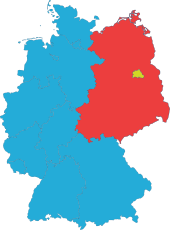Capital of Germany
This article includes a improve this article by introducing more precise citations. (July 2012) ) |
It has been suggested that this article be merged into History of Berlin. (Discuss) Proposed since February 2024. |
The capital of Germany is the
History
Pre-1871
Prior to 1871, Germany was not a unified
After the
1871–1945
It was only during the 1871
1945–1990

In 1949, with sovereignty regained the country split up into West Germany and East Germany. Berlin was also divided, into West Berlin and East Berlin. Originally, Frankfurt was to be the provisional capital of West Germany. However, West German authorities intended to make Berlin the capital if Germany were ever reunified. They feared that since Frankfurt was a major city in its own right, it would ultimately be accepted as a permanent capital and weaken West German support for reunification. For this reason, the capital was located in the smaller university city of Bonn as a more obviously provisional solution. Another factor was that Bonn is close to Cologne, the hometown of West Germany's first chancellor, Konrad Adenauer. East Germany claimed East Berlin as its capital, even though Berlin as a whole was still legally occupied territory, and would remain so for 45 years.
1990–present
In 1990, with the reunification of Germany, Berlin was also reunified and became the capital of the enlarged Federal Republic of Germany. There was some debate, however, on whether the seat of government should move to Berlin. Many believed that Bonn should remain the seat of government – a situation analogous to that of the Netherlands, where Amsterdam is the capital but The Hague is the seat of government. In 1991, after an emotional debate, the Bundestag voted to move the seat of government to Berlin by 1999. However, six ministries remained in Bonn, each with a second office in Berlin.
